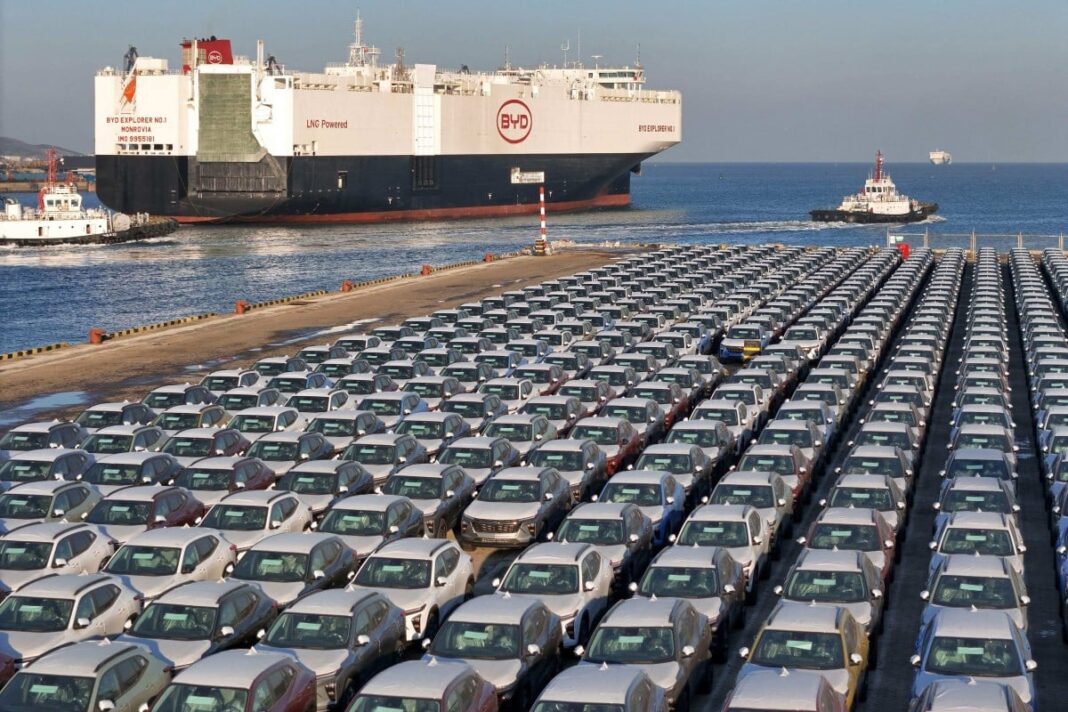The Crisis Unfolding in Brussels
It was a freezing December morning on the outskirts of Brussels, and workers at the Audi factory gathered outside the gates. But this wasn’t a regular shift; they were protesting the closure of their factory. The plant, which has been operating for decades, is shutting down. This marks a significant change not just for the workers, but for Europe’s economy as a whole.
The workers had been at the picket line all night, surrounded by fires made from old pallets and furniture. The reason for their protest? Volkswagen, Audi’s parent company, plans to move production to Mexico, resulting in the closure of this plant and two others in Germany. It’s a decision that reflects larger trends in Europe’s industrial sector, and many workers fear that their jobs are just the beginning of a wider crisis.
China’s Impact
What does China have to do with this? The slowdown in China’s economy is having a massive impact on Europe. For years, companies made a lot of money exporting products to China. But that’s no longer the case. Imports percentages have dropped by 4.4% in 2024, and this is hitting industries hard.
Germany, Europe’s biggest economy, is feeling it the most. German companies, particularly in the automotive sector, have seen their profits shrink. Sales of cars like BMW, Mercedes-Benz, and Audi in China are dropping. Audi alone saw a decline of 11% in sales. This slowdown in demand from China, combined with weak demand in Europe, is making it difficult for businesses to maintain their profits.
German Factories Hit Hard
The closure of Audi’s factory in Brussels is a sign of the growing problems in industrial sector. Audi’s parent company, Volkswagen, is struggling. Despite increasing investments in China, the company is facing declining profits. The same is true for other European carmakers. With China’s market slowing down, these companies are finding it harder to stay competitive.
This is not just about a few car factories closing. It’s a much bigger problem. Chinese manufacturers are starting to take over more and more of the market. As China’s own manufacturing sector grows stronger, it is putting pressure on German industries that once thrived. The rise of Chinese companies is reshaping global markets, and Europe is feeling the squeeze.
The Growing Competition from China
China’s economic growth has been driven by its ability to produce goods at a lower cost. This has made Chinese companies a fierce competitor in markets around the world. European carmakers are facing this competition directly, as Chinese manufacturers expand into Europe. In fact, the car market is just one example. Chinese companies are also dominating other sectors like technology and clean energy. This trend is forcing European companies to either cut costs or risk losing market share.
The shift is clear. In 2024, China’s trade surplus hit a new record, and it’s showing no signs of slowing down. While European companies used to benefit from selling their goods in China, now they are facing competition from Chinese products that are often cheaper and just as good. For these industries, the rise of China is both a challenge and a threat.
The Bigger Picture
Europe is now stuck between two giants: China and the United States. As Chinese companies push for more market share, European industries are finding it harder to compete. On top of this, the EU is facing the possibility of trade tensions with the U.S., which could make things worse. This combination of factors is putting a lot of pressure on Europe’s industries, especially those in Germany, which is so dependent on exports.
The Future of Industries
So, what does the future hold for Europe? The reality is, the industrial sector is facing tough times. Factories are closing, jobs are being lost, and companies are struggling to maintain profits. The slowdown in China is a major part of the problem, but it’s not the only factor. European industries are facing rising competition from Chinese firms and other challenges, such as changing global trade rules.
European officials are aware of the problem but don’t have easy solutions. Meanwhile, workers like those at the Audi plant in Brussels are left uncertain about their futures. The factory’s closure is a sign that Europe’s industrial strength is in jeopardy.
As the world economy continues to change, European industries will have to adapt. But whether they can remain competitive in the face of China’s rise and other global challenges remains to be seen. The next few years will be crucial in determining whether EU nations can maintain its industrial power or whether it will be overtaken by competitors from China and beyond.

